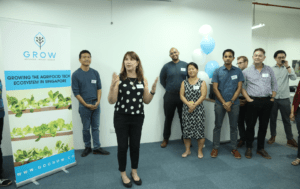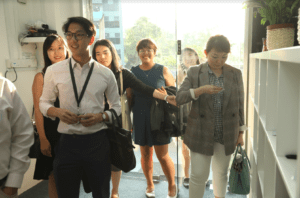Temasek, Enterprise Singapore, Mondelez International, Cargill, Ferrero, Nestle, and Mitsubishi.
Those were some of the big names that joined in the fun at GROW’s “Meet The Cohort” on September 11, at its new Singapore headquarters at the LaunchPad @ one-north. The talents behind the nine startups of the GROW Agrifood Tech Accelerator showed up in full form, dazzling the audience with their snappy, yet polished minute-long pitches.
GROW is AgFunder’s joint venture with agrifood accelerator Rocket Seeder. It was established with the support of the Singapore government through its business agency Enterprise Singapore and the Economic Development Board.
Check out why AgFunder’s founding partner & executive director of GROW, Michael Dean, launched the accelerator, here.
| Meet the GROW Cohort! | ||
| Name | Tech | Country of Origin |
| Algae-based alternative proteins for plant-based meats | Chicago, US | |
| 2. Future Fields | Growth factors and media for cellular ag | Edmonton, Canada |
| 3. Intello Labs | AI & multispectral tools for food monitoring | Gurugram, India & Singapore |
| 4. Nanolambda | Nanotech-based optical spectrum analyzers for agrifood quality monitoring | Daejeon, South Korea |
| 5. SinGene | Platform for microbial contamination detection & analysis | Singapore |
| 6. SinGrow | Tropical climate-optimized strawberry genetics and growing tech | Singapore |
| 7. Tractor Junction | Digital marketplace for India’s $18bn tractor industry. | India |
| 8. Viridis RS | Big data and analytics for smallholder insurance. | Boston, US; relocating to India |
| 9. Wittaya Aqua | Aquaculture farm management, decision support and predictive analytics tech. | Toronto, Canada |
“Meet the Cohort” was a fantastic success. We are delighted by the level of enthusiasm and engagement from the leading agrifood corporations and investors in Singapore,” said Michael Dean, executive director of GROW, who’s also AgFunder’s founding partner.

As outlined by Dr Christine Pitt, GROW’s executive director, the nine startups have been subjected to some very ‘deep dives’ into their businesses in this first week as GROW look sto propel them along their journey.
“They have responded amazingly, really digging into what will ensure they achieve their ambitious growth targets and then some! We are very confident that Demo Day in March 2020 will attract significant interest from the global investor community,” she said.
Adding to the positivity was Rob Hulme, the Asia director of GROW’s program partner Beanstalk AgTech; Hulme called the diversity and depth of the various teams “impressive.”
Hailing from Canada, the US, India, South Korea, and Singapore, the nine startups are full to the brim of fresh ideas and great rhetoric, impressing many of the crowd in attendance.
“Intello Labs seems to be the most promising startup based on the stage of the supply chain they’re at,” says Ting Yan Leck, partner of local venture capital firm TRIVE. “As a consumer, I’m eager to try the strawberries of Singrow though.”
That attention goes both ways. GROW’s final nine, who were narrowed down from an extremely varied pool of over 160 startups, call the conversations they had with the turnout of nearly 60 industry folks, invaluable.

How did partnering with GROW, help?
“We had great chats with giant food corporations, such as Mondelez, Nestle and will be following up with them. It was also great to catch up with the familiar faces at Enterprise Singapore,” said Tanmay Bhargava, head of Asia Pacific at Intello Labs.
Bill Choi, CEO of South Korean startup Nanolambda, was delighted to rub shoulders again with Nestle, who had been one of his early customers back in 2010. Meeting the ag giant’s representatives again in the Lion City helped spark off new conversations, which Choi says he’ll ‘build on.’
“All this was made possible because of the expertise of the experienced GROW team,” remarked Choi.
What Does GROW Offer?
|
What the guests called a ‘well-run’ and ‘amazing event with ‘great beer,’ was in fact, the blood, sweat and tears of the mean, lean GROW team machine. But it wouldn’t have been possible without the hard work put in by the promising startups, which have grown exponentially since they first stepped in the door on Monday, September 9.
“The startups have been working hard on refining their value propositions, business models and pitches. It really shone through on the night in their pitches,” says Joshua Soo, the accelerator’s head of Innovation and Strategy, “we’ve been working closely with the startups to understand their business and aspirations as founders.”
“The GROW team has offered us a lot of help. Michael helps us reach out for high-end customers. Christine guided us to validate and finalize our business model; instead of just selling strawberry farming solution, she suggested to emphasize on the advanced agtech platform we are able to offer. Joshua worked through every slide of my pitch deck to help us improve,” explains Singrow CEO Bao Shengjie, breaking down the focused help rendered by the GROW team.
“Although we’ve only been involved for one week, I already find clearer what we need to achieve in the following two months. We will start to work on it to better prepare us for mass production,” adds Bao.

As the first week of the program nears its close, there’s still plenty of room for startups… to GROW. The accelerator is a six-month program conducted in 2 parts: an initial 12-week intensive program followed by a further three months working on business growth plan with the help of mentors, coaches, and access to GROW’s global network. All the hard work culminates in Demo Day in March 2020, when all participants show up in Singapore to flex their startup muscle.
Stay tuned to AFN as I’ll be speaking to the startups one-on-one, to flesh out what they’re all about.
First out the gate will be an in-depth profile and discussion with Tractor Junction, a digital marketplace for tractors in India, and Viridis RS, a startup providing remote sensing technology for insurers to provide crop insurance to farmers in the developing world.





